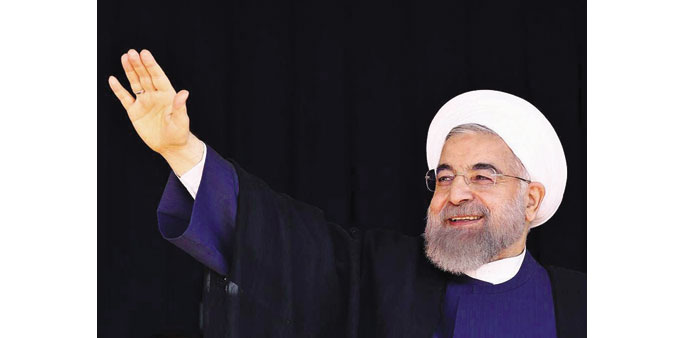A handout picture released by the official website of Iranian President Hassan Rouhani shows him waving to the crowd during a public meeting in the town of Malard, 50km west of Tehran, yesterday.
AFP/Tehran
An overwhelming majority of Iranians want peace with the rest of the world, President Hassan Rouhani said yesterday, defending the nuclear negotiations under way with major powers.
“Despite a small minority that speak loudly, the vast majority of the population are in favour of peace, reconciliation and constructive agreement with the world,” Rouhani said during a televised speech in Shahriyar, west of Tehran.
Iran and the so-called P5+1 group (Britain, China, France, Russia, the United States and Germany) have been engaged for nearly two years in negotiations on Tehran’s nuclear programme to prevent Tehran from getting the bomb, in exchange for the easing of international economic sanctions.
The two sides signed a framework agreement on April 2 and aim to finalise a deal by June 30.
The negotiations, approved by Iran’s Supreme Leader Ayatollah Ali Khamenei, have support within the country and among the Iranian political class.
But some conservatives have criticised the concessions made to the West.
“We are determined to solve our problems with the world through logic, reasoning and negotiation,” Rouhani said, adding that “the strong nuclear negotiating team takes serious steps every day toward protecting the rights of the nation.”
During a closed session in parliament on Sunday, ultraconservative lawmakers strongly criticised Foreign Minister Mohamed Javad Zarif and his deputy Abbas Araqchi, who are leading the nuclear talks with major powers.
The lawmakers accused them of having accepted in principle military site inspections by foreign experts, which have been ruled out by Khamenei.
Araqchi later said the negotiating team had refused such inspections.
*Israeli Prime Minister Benjamin Netanyahu warned yesterday that a nuclear-armed Iran would be “a thousand times more dangerous and more destructive” than the Islamic State group, his office said.
“As horrific as ISIS is, once Iran, the pre-eminent terrorist state of our time, acquires nuclear weapons, it will be a hundred times more dangerous, a thousand times more dangerous and more destructive than ISIS,” Netanyahu said, referring to IS.
Nuclear accord ‘unlikely’ by June 30
Reuters/Washington
An Iran nuclear deal is not likely by June 30 because technical details will remain to be defined and Iran will not get sanctions relief before the end of the year in the best of cases, Western ambassadors said yesterday.
Six major powers are seeking to negotiate an agreement under which Iran would limit its nuclear programme in exchange for the easing of economic sanctions that have crippled its economy.
Envoys from Britain, France and Germany, three of the so-called P5+1 group that includes China, Russia and the United States, sketched out their expectations for the end game as a self-imposed June 30 approaches.
“It’s very likely that we won’t have an agreement before the end of June or even (right) after,” French ambassador to the United States Gerard Araud said in an appearance at the Atlantic Council think tank with his British and French counterparts.
The Iranians want to force the six powers’ ministers to decide the issues, rather than lower-level officials, Araud said, saying he expected some melodrama toward the end with late nights and doors slammed as both sides jockey for the best deal.
“Even if we get the best deal ... afterwards, you will have to translate it into the technical annexes, so it may be ... we could have a sort of fuzzy end to the negotiation,” he said.
Speaking after the event, Araud said it could take a few weeks of July to complete the technical annexes that are envisaged under an agreement if one can be reached.
Iran and the six powers reached a framework agreement on April 2, but several issues remain unresolved.

